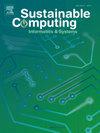复杂系统网络数据包络分析模型中的模糊公平效率评价:在可持续供应链管理中的应用
IF 5.7
3区 计算机科学
Q1 COMPUTER SCIENCE, HARDWARE & ARCHITECTURE
引用次数: 0
摘要
网络数据包络分析(NDEA)是一种评估具有网络结构的同构决策单元(dmu)性能的常用数学方法。在具有多阶段结构的开放串联系统中,当存在多个最优权值时,如何确定各阶段的公平效率是至关重要的,从而使各阶段具有相互合作的动机,以实现整个系统的最高性能。本文提出了一种基于NDEA模型的多阶段开放串联系统公平效率评估方法。然后,为了处理定性数据和某些变量值的不确定性,在模糊设置下建立了建议的NDEA模型,使用模糊集参数化语言项。本研究提出的方法具有以下在以往研究中所没有的特点:首先,在系统整体效率保持不变的情况下,该方法可以为系统在任何不确定性水平下的各个阶段提供独特而公平的效率分解。其次,提出的方法证明了所获得的效率分解在各个阶段之间表现出公平的权衡。第三,该方法可以在存在不希望的中间输出的多阶段系统中提供公平的效率分解,其中不希望的中间输出可以在处理后作为输入重复使用。通过对9个番茄酱生产商供应链和22个家电供应链进行绩效评估的两个实际案例研究,证明了所提出方法的应用是合理的。本文章由计算机程序翻译,如有差异,请以英文原文为准。
Fuzzy fair efficiency assessment in network data envelopment analysis models for complex system: An application in sustainable supply chain management
Network data envelopment analysis (NDEA) is a common mathematical technique to evaluate the performance of a set of homogeneous decision-making units (DMUs) with a network structure. In an open-series system with a multi-stage structure, it is crucial to determine fair efficiency for each stage when multiple optimal weights exist, so that the stages have incentives to cooperate with each other to achieve the highest possible performance of the entire system. This study suggests a novel approach based on the NDEA model to assess the fair efficiency of an open-series system with a multi-stage structure. Then, to deal with qualitative data and uncertainty in the values of some variables, the suggested NDEA model is developed in a fuzzy setting, using linguistic terms parameterized through fuzzy sets. The proposed method in this study has the following features that cannot be found in previous studies. First, the proposed method can provide a unique and fair efficiency decomposition for the stages of a system at any level of uncertainty while the overall efficiency of the system remains unchanged. Second, the proposed methodology proves that the achieved efficiency decomposition shows a fair trade-off among the stages. Third, the proposed method can provide fair efficiency decomposition in multi-stage systems in the presence of undesirable intermediate outputs, in which undesirable intermediate output can be reused as input after processing. The application of the proposed methodology is justified by two real-case studies that include performance evaluations of 9 tomato paste producer supply chains and 22 home appliance supply chains.
求助全文
通过发布文献求助,成功后即可免费获取论文全文。
去求助
来源期刊

Sustainable Computing-Informatics & Systems
COMPUTER SCIENCE, HARDWARE & ARCHITECTUREC-COMPUTER SCIENCE, INFORMATION SYSTEMS
CiteScore
10.70
自引率
4.40%
发文量
142
期刊介绍:
Sustainable computing is a rapidly expanding research area spanning the fields of computer science and engineering, electrical engineering as well as other engineering disciplines. The aim of Sustainable Computing: Informatics and Systems (SUSCOM) is to publish the myriad research findings related to energy-aware and thermal-aware management of computing resource. Equally important is a spectrum of related research issues such as applications of computing that can have ecological and societal impacts. SUSCOM publishes original and timely research papers and survey articles in current areas of power, energy, temperature, and environment related research areas of current importance to readers. SUSCOM has an editorial board comprising prominent researchers from around the world and selects competitively evaluated peer-reviewed papers.
 求助内容:
求助内容: 应助结果提醒方式:
应助结果提醒方式:


